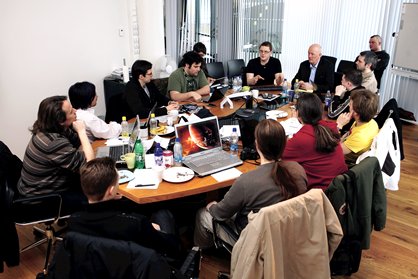What all developers should learn from EVE Online
When players and devs work together, magic happens
This is revolutionary; in one swift move, the CSM went from what could be considered a glorified focus group to what CCP considers to be a “stakeholder” in the company, given equal consideration with every other department in requesting development time for a project. That means the CSM - and the entire playerbase it represents - has as much influence on development projects as Marketing, Accounting, Publicity and all the other teams outside of the development team.

This is, of course, the stated intention. But has any developer gone to such lengths for its fans? I’ve spent a week observing CCP, taking inventory of concerns and complaints from even the most aggravating of griefers among its players; there seems to be little question that CCP genuinely believes in the importance of the players’ feedback through the CSM, and the step to incorporate it into the company’s internal process goes a long way toward proving that their belief in player-driven experiences is no mere gimmick or promotional device.
If anything, EVE Online appears to be achieving what many social virtual worlds backed by millions of dollars of capital - including There and Second Life - have failed to do: to create an automous, player-driven society in cyberspace. This is what CCP believes produces the absolute best games, and it’s willing to take extraordinary risks to prove it.
The last day: 3 a.m.
Walking between bars in the wee hours of the morning on my last day in Reykjavik, we ran into a group of Icelanders singing and dancing down the street while another group threw beer bottles on the ground in the alleyway next to us.

It suddenly hit me that EVE Online could only come out of a place like Iceland - a place where packs of friends wander the streets drunk until 6 a.m., doing pretty much whatever they want; a place where the only government presence I saw all week was an information center; a place where the people pretty much monitor themselves. CCP adopted this people-centric culture inside their company and inside their game, and now they’re proving that giving the power to the players can work for game development as well. Self-governance has never looked quite so sexy.
May 17, 2010


Could motion control cause a game market "crash"?
How waggle may one day crumple the industry

The new wave of indie MMO gaming
How the PC's best bedroom coders are outclassing the big boys
Weekly digests, tales from the communities you love, and more

How to fix what's wrong with PC gaming
The platform is powerful but flawed - here are 12 things that require a reboot


